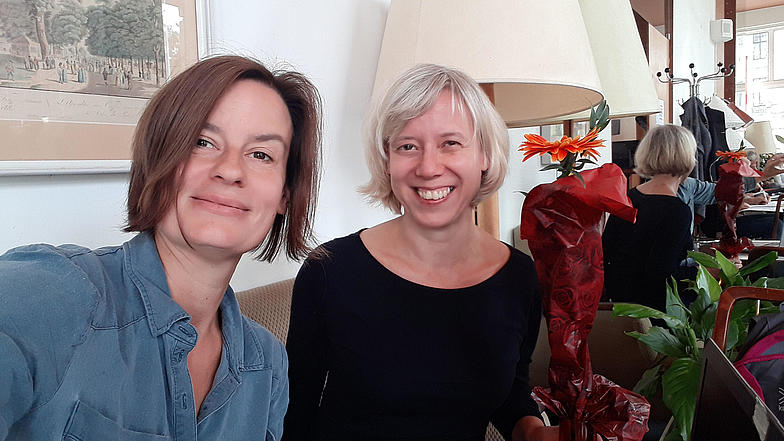Coincidence or fate? The foodwatch Supervisory Board had just decided to look into whether it would be feasible to set up a new office with a lean operating structure in a country like Austria or Belgium, when foodwatch founder Thilo Bode got mail from Vienna. Lisa Kernegger and Heidi Porstner from Vienna wrote: “We have been following your work with great interest for some time now and have come to the conclusion that Austria is in need of an organisation with your profile.” It was the starting signal for foodwatch Austria.
Lisa and Heidi are experienced campaigners. Having worked for the Austrian environmental protection organisation Global 2000 for ten years, both of them know a lot about pesticides, genetic engineering, agriculture, environmental protection and harmful substances in foods. Lisa’s academic background is in biology, and Heidi’s is in nutrition science. They describe each other as their “favourite colleagues”. Committed, professional and fearless, they were the perfect team for setting up a new foodwatch office.
How did you decide to launch foodwatch Austria?
Heidi: At lunch one day, we were discussing Austrian NGOs and realised that there wasn’t a single organisation in Austria focused solely on the issue of food from a consumer perspective.
Lisa: It was essentially our lunch that brought us to foodwatch. We figured that foodwatch-like campaigns on food-related issues are missing in Austria.
Heidi: We were convinced that Austria needed an organisation like foodwatch. We got a notion that people felt the need for someone in Austria to defend their food-related consumer rights. And we really wanted to organise it, to try out and set up something new. We also have a great deal of experience with the work of NGOs.
Lisa: We are both campaigners and are therefore very highly qualified for the kind of work foodwatch does. This is why we decided to write foodwatch International and ask whether they would be willing to let us found foodwatch Austria. They were thrilled!
What motivates you?
Lisa: David and Goliath, injustices.
Heidi: The outrage. Many food companies can do whatever they want: they deceive and mislead us. However, if there are enough of us, we can change things. foodwatch is the hard-hitting organisation that is needed for taking on these companies.
Lisa: We want to present a forceful counterweight to the food industry. And foodwatch is this counterweight.
What are your issues?
Lisa: The issues we’ve gone public with so far are food fraud, origin labelling and nutrition labelling, meaning the Nutri-Score.
Heidi: Austrians care a lot about where their food comes from. Food manufacturers are also aware of this fact. This is why there are so many supermarket products with an Austrian flag or “Mascherl”. Many food packages use claims like “Made in Austria” or “Quality from Austria”, which can easily mislead consumers as many of the ingredients aren’t even ingredients originating from Austria. Many products are simply packaged, filled or bottled in Austria. We urgently need foodwatch, who can draw attention to these cases.
Lisa: During the coronavirus lockdown, the issue of where food comes from received a lot of attention in the media. Regional and Austrian products were being advertised all over the place: from the tavern to the supermarket.
Heidi: Food fraud is of course one of foodwatch’s core issues, and it affects all consumers on a daily basis.
Lisa: The Nutri-Score label is currently at the top of the political agenda. In the coming months, it will be decided at European level whether the label should be made mandatory in all EU Member States. Owing to the explosive nature of the issue, it’s clear that we have work to do.
What have been your biggest successes? And what were your biggest obstacles?
Heidi: The fact that the website is online and that we’ve been able to go public is a huge success. We managed to set everything up in a year’s time.
Lisa: One year isn’t much time when it comes to launching an organisation. Especially if you consider that we started from scratch: we didn’t even have telephones, computers or an office. What we did have were employment contracts, which was nice (laughs). Normally, when you start working on something, there’s some kind of infrastructure already in place. We didn’t even have desks.
Heidi: We started at a small table in a coffee house. We’ve come a long way (laughs).
As Austrians, what do you think of foodwatch Germany?
Heidi: I see foodwatch Germany as a hard-hitting and courageous organisation that stands up to even the most powerful interests and will stop at nothing.
How do foodwatch Germany and foodwatch Austria differ?
Heidi: As foodwatch Austria, we use a different language than foodwatch Germany. We’ve also developed our own profile. We live here and know exactly what issues are on the minds of our fellow Austrians because we hear about them on a daily basis. In addition, it’s easier to mobilise people when you’re in the same country.
Lisa: For example, our recipes and selection of food products differ greatly from those of the German market. The supermarket landscape is also different.
Heidi: Austrian food culture was strongly influenced by the monarchy. Recipes and product descriptions, like Kaiserschmarrn, often come from this period. (laughs)
